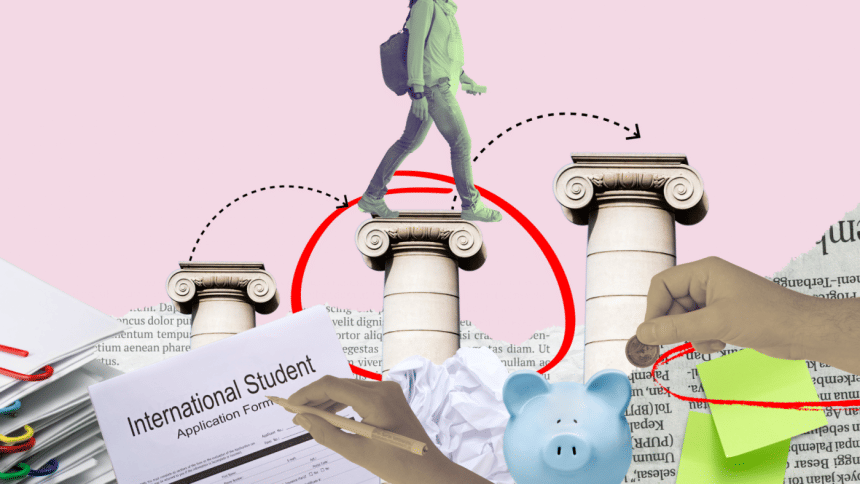The impact of privilege on US college applications

Every year, millions of ambitious students embark on their college application journey, eagerly anticipating the fruition of their hard work. Beneath the surface of this seemingly meritocratic process lies a web of factors that significantly influence the outcomes. One such determinant is the role of privilege.
While many applicants work their fingers to the bone to present their best selves on paper, the reality remains that some individuals are inherently positioned with better odds right from the start.
Razoun Siddiky, the former EducationUSA Advisor, says "One of the biggest barriers people face is the lack of correct information from reliable sources. People often seek information from their friends or relatives who might not have a comprehensive understanding as to what the process truly entails. This often hinders their application process and consequently impacts the outcome."
Extracurricular activities (ECAs) are important when applying to US colleges as they paint a broader picture as to how an applicant performs beyond numbers and figures. The most common route to accessing these opportunities is to attend a school that has adequate resources, which is more common in expensive English medium schools in Dhaka.
Tashrique Ahmed, a rising sophomore at Williams College hailing from Sylhet, says "While I was fortunate enough to possess the means to travel to Dhaka and buy the equipment required for the robotics olympiad, a lot of my friends did not have the same financial privilege. In several cases, their parents did not support them going all the way to Dhaka and participating in national rounds of olympiads, doubting the importance of such experiences."
Mrinmoyee Guha, a student at Yale University looks back on her memories from her time as a student at Sunnydale school, where she established Bangla club.
"Although the support was very limited for the smaller and the newer clubs, the more popular activities such as sports and debate benefited a lot from having paid mentors. The school often provided transportation for the events where Sunnydale was officially invited, which made those more accessible for us. Even though financial or logistical aide was not always available, the teachers would always motivate the students towards achieving things on their own, even outside the school," she says.
Razoun Siddiky adds, "Institutions and teachers often exhibit reluctance to support students' aspirations of studying abroad right after high school, particularly in girls' schools. I recall a conversation with the principal of a well-known girls' school in Dhaka, who openly admitted her lack of confidence in sending students from her school abroad. Nevertheless, it is inspiring to note that despite these barriers, numerous girls from that very school have achieved admission to some of the finest universities over the past few years."
Adding to the school administration's reluctance, another significant barrier that proves exceedingly difficult to overcome is the lack of parental support.
Rafia Tanjin Kibria*, a twelfth-grade student at Viqarunnisa Noon School & College, shares the numerous hurdles she faced due to conservative attitudes within her family.
"Despite our family's financial stability, I found it challenging to muster the courage to ask my father for the SAT registration fees. Instead, I had to approach one of my maternal aunts for assistance. The fear of raising the topic of studying abroad altogether persists, as it might steer the discussion toward the prospect of an early marriage, even though I am just eighteen. The conservative beliefs my family holds have firmly convinced them that I must be married before venturing abroad to avoid bringing 'shame' to our family."
"I believe my parents would have been much more supportive if I were a boy. Even though men around us have acquired degrees from foreign universities, they have repeatedly advised my father against sending his daughters abroad to study. In their eyes, the chances of us getting married decrease as they view an 'overqualified' girl as less desirable," she laments.
The negative repercussions of schools not being supportive make the already daunting process even more challenging. Tashrique shares his personal experience, recounting how he had to sit down with his teachers to provide them with an overview of the application process, facing obstacles along the way.
"I found my teachers were unfamiliar with the role of a counsellor, and they had no prior experience in writing recommendation letters or using the Common App. I had to provide them with five or six sample recommendation letters to guide them on the format. For about three or four months, I had to shuttle between the administration's office and the teacher's office to ensure my transcripts and recommendations were submitted correctly and on time," he recalls.
Most US universities operate under a "need-aware" policy, meaning an applicant's ability to pay for their education can impact their chances, unlike a "need-blind" policy where finances are not considered. Only seven universities follow a need-blind policy for international applicants, while the number is higher for US citizens, giving them an advantage in the application process compared to the average international applicant.
Tasneem Reza, a permanent resident of the US, born in Bangladesh and currently a rising sophomore at the University of Pennsylvania, highlights the discrepancy, stating, "Many universities offer scholarships exclusively for citizens or permanent residents, and while some are need-blind for domestic students, only a few extend the same policy to international students. Given the high tuition costs at these colleges, a need-blind policy gives a greater edge to domestic applicants over international ones."
This means that applicants from Bangladesh who are also US citizens have an overall advantage in the application process. Tasneem further notes that US citizens or permanent residents are eligible for Federal Student Aid (FAFSA), which is based on household and income circumstances.
"FAFSA is particularly beneficial for state or city universities with lower tuition fees. If you receive federal aid, it eases the financial burden, especially for non-dorming students," adds Tasneem.
Recognising these disparities, colleges have been proactively striving to create a more inclusive and fair application process. However, in cases where privilege becomes so pronounced that certain individuals lack access to the application process entirely, schools must take decisive action. This includes the establishment of dedicated counsellors, increased awareness and support from teachers, as well as allocating more funding for ECAs.
When we find ourselves to be on the more privileged end of the scene, we should acknowledge all that we've been fortunate enough to receive before boasting about our achievements or, even worse, belittling others who haven't reached the same point. Considering that college applications are heavily influenced by factors beyond our control, it would be worthwhile if we all took a moment to take a step back and reflect before allowing these outcomes to dictate our self-worth.
*Names have been changed for privacy

 For all latest news, follow The Daily Star's Google News channel.
For all latest news, follow The Daily Star's Google News channel. 








Comments